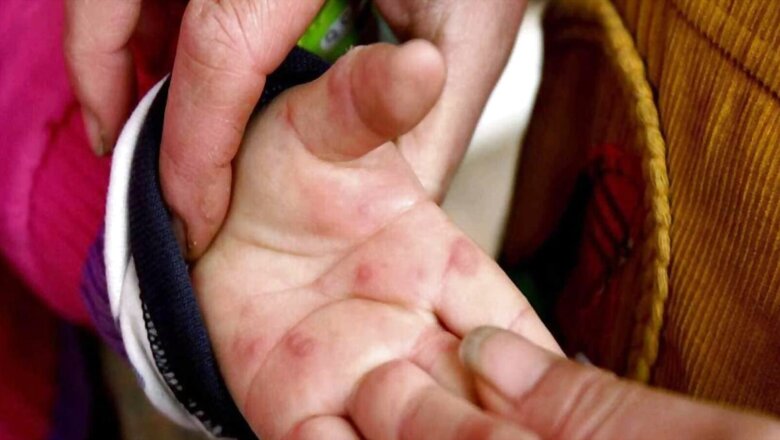
views
Noting an alarming surge in cases of tomato fever or tomato flu in India, experts have warned about further outbreaks which began in Kerala’s Kollam and have so far infected 82 children. According to a study published in the Lancet Respiratory Journal, the common infectious disease targeting mostly children aged 1–5 years and immunocompromised adults could also be a new variant of hand, foot, and mouth disease (HFMD).
The study said the rare viral infection is in an endemic state and is considered non-life-threatening and is reported amid concerns of a probable fourth wave of the Covid-19 pandemic. “Just as we are dealing with the probable emergence of the fourth wave of Covid-19, a new virus known as tomato flu, or tomato fever, has emerged in India in the state of Kerala in children younger than 5 years. The rare viral infection is in an endemic state and is considered non-life-threatening; however, because of the dreadful experience of the Covid-19 pandemic, vigilant management is desirable to prevent further outbreaks,” the study found.
Commonly known as ‘tomato flu’, the infectious disease is caused by intestinal viruses and occurs mostly in children. The illness is rare in adults as they usually have immune systems strong enough to defend them from the virus.
The study noted that although the tomato flu virus shows symptoms similar to those of Covid-19 including initial onset of fever, fatigue, and body aches and rashes on the skin, the virus is not related to SARS-CoV-2.
Tomato fever could be an after-effect of chikungunya or dengue fever in children rather than a viral infection, the Lancet study noted adding that the flu is a self-limiting illness and no specific drug exists to treat it.
First Cases in Kerala
The tomato flu was first reported in the Kerala’s Kollam district of Kerala on May 6, 2022. More than 82 children younger than 5 years found with the infection have been reported by the local government hospitals as of July 26, 2022. The other affected areas of Kerala are Anchal, Aryankavu, and Neduvathur. Precautionary measures are being taken by the Kerala Health Department to monitor the spread of the viral infection and prevent its spread in other parts of India.
Odisha
Twenty-six children have been diagnosed with the hand, foot and mouth disease (HFMD) in Odisha by the Regional Medical Research Centre in Bhubaneswar.
This endemic viral illness also triggered an alert to the neighbouring states of Tamil Nadu and Karnataka to increase their vigilance in the border districts. However, apart from Kerala, Tamil Nadu, and Odisha, no other regions in India have been affected by the virus.
Symptoms
According to the World Health Organization (WHO), in most cases, the viral illness has symptoms like fever, painful sores in the mouth and rash with blisters on hands, feet and buttocks.
The Lancet study notes the primary symptoms observed in children with tomato flu are similar to those of chikungunya, which include high fever, rashes, and intense pain in joints. Named tomato fever due to red and painful blisters throughout the body that grow to the size of a tomato, they also resemble those blisters in monkeypox virus cases in young individuals.
Rashes on the patient’s body lead to skin irritation and like other viral infections, the symptoms include fatigue, nausea, vomiting, diarrhoea, fever, dehydration, swelling of joints, body aches and common flu, which are similar to dengue.
Diagnosis
In children with these symptoms, molecular and serological tests are done for the diagnosis of dengue, chikungunya, zika virus, varicella-zoster virus, and herpes. Once these viral infections are ruled out, contraction of tomato virus is confirmed, the study notes.
Treatment
As tomato flu is similar to symptoms of chikungunya, dengue and hand, foot, and mouth disease the treatment for the infection is also similar. Patients are advised to isolate, rest, plenty of fluids, and hot water sponge for the relief of irritation and rashes. “Supportive therapy of paracetamol for fever and bodyache and other symptomatic treatments are required,” it stated.
Risk and Outbreak
The study noted that children are at increased risk of exposure to tomato flu as viral infections are common and likely to spread due to close contact. Infants are prone to the infection through nappies, touching unclean surfaces and unhygienic practices. Due to similarities to hand, foot, and mouth disease, “if the outbreak of tomato flu in children is not controlled and prevented, the transmission might lead to serious consequences by spreading in adults as well,” the study noted.
“Very Contagious”
The study warned that tomato flu is “very contagious” and similar to other types of influenza and called for “careful isolation of confirmed or suspected cases and other precautionary steps to prevent the outbreak of the tomato flu virus from Kerala to other parts of India.”
“Isolation should be followed for 5–7 days from symptom onset to prevent the spread of infection to other children or adults,” the study said. The best solution for prevention is the maintenance of proper hygiene and sanitisation of the surrounding necessities and environment as well as preventing the infected child from sharing toys, clothes, food, or other items with other non-infected children, it added.
However, it said no antiviral drugs or vaccines are available for the treatment or prevention of tomato flu. “Further follow-up and monitoring for serious outcomes and sequelae are needed to better understand the need for potential treatments,” it said.
Read the Latest News and Breaking News here



















Comments
0 comment